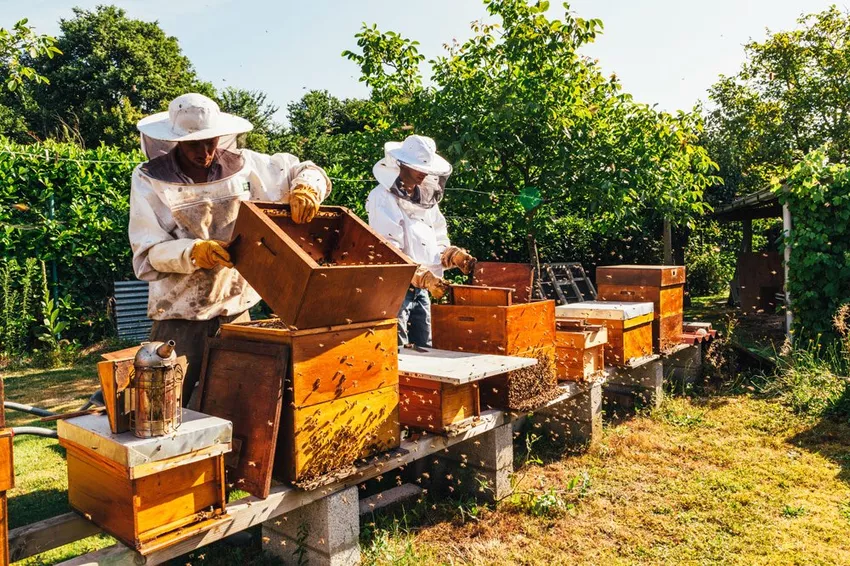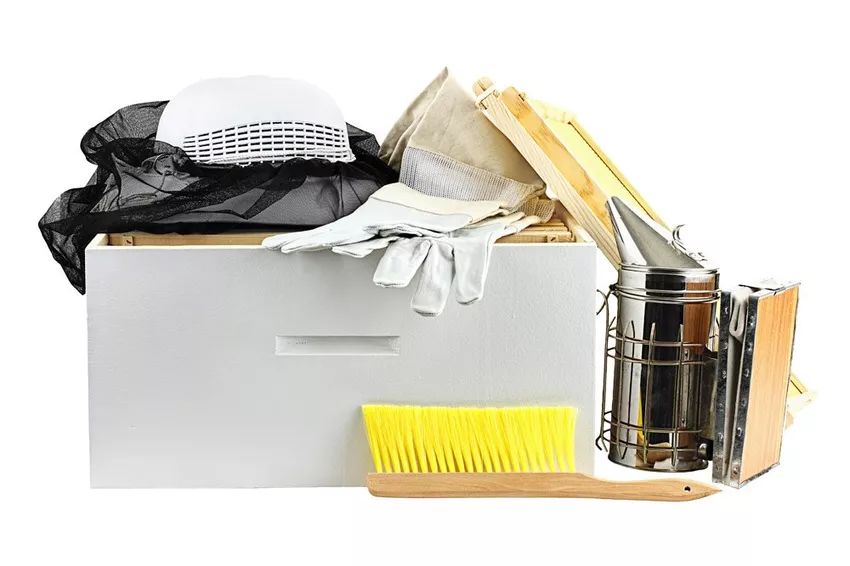Some are afraid of them, others admire them: bees. If you're one of the latter, beekeeping in the garden might be something for you.

A garden without insects is like a garden without flowers. Because the small animals, such as butterflies, not only beautify the landscape, many insects are also very useful animals. For example, bees can greatly benefit the plants in the garden. This is exactly why many kill two birds with one stone and keep bees in the garden.
There are currently a particularly large number of beekeepers in the cities, because it is sometimes even easier there than in the country. In rural areas it is often no longer possible to find the ideal habitat for the insects due to monoculture. In addition, pesticides are often used, which can be dangerous to bees. Nevertheless, the hobby beekeeping in the garden is finding more and more followers and can actually become a very interesting leisure activity. And by the way, you can also enjoy your own honey.
Prerequisites for successful beekeeping
Of course, beekeeping is not a hobby that you should choose lightly and thoughtlessly. It is not equally suitable for everyone. Finally, a few important basic requirements must be met so that beekeeping can also be realized. These requirements are summarized below:
➥ Target group:
You can definitely devote yourself to beekeeping as long as you are still employed. For pensioners, however, the hobby is particularly recommended. Because that way they also have a meaningful job at the same time.
If your passion for beekeeping starts early and you want to turn your hobby into a career at some point, you can train to become an animal keeper (specializing in beekeeping). If there are children in the house, beekeeping in the garden is not recommended.
➥ The joy of beekeeping & nature:
The be-all and end-all is of course the joy of beekeeping, because especially at the beginning the focus should not be on the honey harvest. Enjoying being outdoors and dealing with nature is also a requirement.
➥ not afraid ofHave Insects:
And don't be afraid of the insects, because you'll have to risk a sting or two.
➥ much time:
And a certain investment of time is also necessary, but no more than with many other leisure activities and hobbies. You only have to invest a little more time at the beginning, because there is a lot to learn. And of course the individual steps also take a little more time at the beginning than with experienced beekeepers. Therefore, it is also recommended for beginners to attend workshops and courses that are often offered by the local beekeeping associations. You must then allow a period of one to two years before you become well acquainted with the job.
➥ Cost:
 Like any hobby, beekeeping is of course associated with costs. The amount of the costs basically depends on the extent to which you pursue this occupation. For the purchase of two bee colonies and the first accessories, for example, you have to reckon with costs of a maximum of 1,000 euros.
Like any hobby, beekeeping is of course associated with costs. The amount of the costs basically depends on the extent to which you pursue this occupation. For the purchase of two bee colonies and the first accessories, for example, you have to reckon with costs of a maximum of 1,000 euros.
It is also important to purchase appropriate protective clothing. This includes a beekeeper jacket, a hat with a veil and protective gloves. To calm the bees when you want to remove the honey, you also need a so-called smoker to produce smoke.
➥ Required space:
Depending on how many bee colonies you want to have, you also need enough space. If you want to earn money with beekeeping, you should plan space for around 30 bee colonies. Initially, however, two to three bee colonies are sufficient, which you can get from a beekeeper.
Tips for hobby beekeeping in the garden
➤ Tip 1 - Time to start:
It is best to start beekeeping in May, because that is when you are most likely to have offshoots, because that is when the bees take care of their reproduction.
It is best to do the work on the beehives early in the morning, because then the insects are still quite sluggish and you can work more relaxed.
➤ Tip 2 - plant fruit trees & flowering plants:
The first honey harvest takes place in spring, after the bees in the area have diligently collected pollen (reading tip: Bees in the garden - 4 tips on how to attract them). For this it is important that you provide the insects with enough fruit trees and flowering plants.
➤ Tip 3 - make sugar water available after harvest:
Late July or earlyAugust you can then harvest delicious honey a second time. You must then provide the bees with sugar water to replace the honey.
➤ Tip 4 - Control bee colonies:
Of course, regular inspection and care of the bee colonies is also part of the hobby beekeeper's tasks. For example, in the spring you have to check the magazines made of wood or styrofoam and see if new queens are growing up. You must then remove these, because they would drive the previous queen and part of her “employees” out of the hive, which would result in a lower honey harvest.
➤ Tip 5 - Prepare for the rest period:
The season ends in autumn. The bees should then calm down a bit, which is why you should make the entrance holes a little smaller.
So that no mice tamper with the beehives in winter, you should also hang bars in front of the entrances in good time.